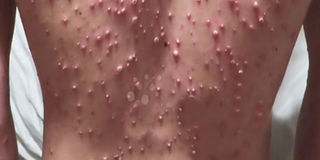Be aware of measles and chicken pox

Idealy, measles vaccination should be given at nine months but not many parents respond to this call. Consequently, measles outbreaks continue to occur repeatedly in various communities.
Chickenpox is an infection caused by a virus which usually attacks children before the age of 10 years but sometimes, it can affect adults. It leaves an itchy rash and black spots all over the body.
Transmission
According to Dr Vincent Bakyenga, a general practitioner at Uganda Health Federation, measles is very contagious. It is spread when respiratory droplets from a person that is infected with the measles virus coughs or sneezes in the air, much like the way a common cold or flu is spread.
He says, “The measles virus can live in the airspace up to two hours. It is so contagious that it is believed that 90 percent of unvaccinated people who come into contact with the virus will be infected.”
The disease is a major concern in children but it often affects the adults even more severely. This is because our immune systems fight germs with cells and with antibodies and this is reduced as we age.
Like measles, chicken pox is highly contagious and can spread quickly from one person to another by direct contact with the rash or by droplets dispersed into the air when the person who is infected by virus coughs or sneezes.
“Once one has chickenpox, the rash appears first as red bumps which spread out all over the body for several days. The bumps then form blisters filled with fluids which turn out to be very itchy and because of the scratching, they may break and leak,” he says.
New bumps continue to appear for several days but with time, layers of dead skin cover the broken blisters and take several more days to heal completely.
Treatment
About one in four cases of both measles and chicken pox will require hospitalization and while many measles cases resolve on their own, some turn out to be pneumonia or central nervous system infections and worst of all blindness. It is therefore important that parents take their children to hospital as soon as they notice any symptoms of measles in their children.
At the time of vaccination, some children develop side effects from the injection site such as pain and swelling or even flu-like symptoms. These are generally mild and occur in the first week. There are rare long-term side effects that occur in people with immune system disorders.
Dr Bakyenga, says, “That a person who has been vaccinated with a measles vaccine can still contract measles. While it is rare, some people do not respond to one vaccine or another. Calamine solution usually helps to soothe the itching .“Good hygiene is encouraged when the child suffers from chicken pox. This will prevent the reinfection. Iron clothes to kill any bacteria or virus.




